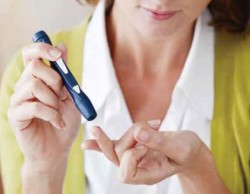Dealing with Diabetes
Find new ways to overcome the difficulties of this disease.
 Being diagnosed with diabetes is difficult — but learning to manage a new diet, exercise schedule and other daily routines can prove even more of a challenge than hearing the news.
Being diagnosed with diabetes is difficult — but learning to manage a new diet, exercise schedule and other daily routines can prove even more of a challenge than hearing the news.
Valerie Burton, RN, CDE, a program coordinator at the Touro Diabetes Center, understands the diabetes adjustment process firsthand. “I was diagnosed with diabetes in 2005,” she says. “There’s so much information out there. I had a really hard time until I started speaking with a nurse here.”
At that point, Burton had worked in orthopedics at Touro for 11 years. One year after her diagnosis, she joined the Diabetes Center team to educate and support diabetic patients who were struggling with the overwhelming amount of available information, coupled with a lack of guidance. Now, she manages the Center’s many patient programs and resources. “We do outpatient and inpatient education,” she says. “We have monthly support groups, and we do community service events, like citywide health fairs, where we screen patients for diabetes.”
Patients at the Touro Diabetes Center are encouraged to take part in its comprehensive educational program, which includes an overview of diabetes and how it affects the body; classes on meal planning; blood glucose monitoring; foot, skin and dental care; and managing stress, complications and emergencies.
“Our classes are so good,” Burton says. “Usually, the first appointment is one-on-one, where we do an initial assessment and determine your needs.” She notes that most major insurers cover diabetes education.
When patients began asking for a way to keep in touch with each other after completion of the program, the Center founded its free monthly support group. “The group is open to the public, though the majority of the people who come are people who have finished the program,” Burton says. “It’s a way to stay connected and have accountability. We have all different types of topics — whatever you need to talk about.”
Another way that Burton helps patients is by clearing up common misconceptions about diabetes — namely, that a diabetes diagnosis always comes with frightening, painful or disruptive complications. “Most people, when they see people with diabetes, associate the disease with the complications of the disease,” she says. But, with proper management and monitoring, serious complications are much less likely to occur.
Living Healthy With Diabetes
Eat Well A nutritious, balanced diet is pivotal to successful diabetes management. “As far as food is concerned, we teach portion control and watching the amount of carbohydrate you take in at one time,” Burton says.
The Diabetes Center recommends eliminating sweetened drinks, as the added sugar in these beverages can spike blood glucose levels. Replace these drinks with their unsweetened counterparts; use low-calorie sweeteners; or simply drink water.
Get Moving Exercise is another important element of living with diabetes. “The minimum amount would be 150 minutes a week, especially if you’re going from zero exercise to starting a regimen,” Burton says. Aerobic exercise, which improves circulation and lowers blood pressure, glucose and cholesterol, is the best type of physical activity for diabetic patients.
Exercise can be low-intensity, such as walking, lifting light objects around your home or gardening. As you build strength, you can slowly increase the amount of activity you do or try new activities.
Stick to the Script Not all diabetes patients take medication or inject insulin. However, if your doctor prescribes medication, it’s important to take it exactly as scheduled. “Sometimes, patients decide, ‘I just want to take a break from diabetes,’” Burton says. “But diabetes doesn’t take a break from us.”
One class at the Touro Diabetes Center helps patients learn how to safely “take a break” from the mental stress of diabetes management without compromising their health. One strategy is to adjust exercise in proportion to diet or caloric intake, such as when on vacation — but medication should always remain a constant. “You never want to stop your meds,” Burton says.
Be Prepared Just as physicians prepare to see patients by going over their medical history, diabetic patients can prepare for their appointments by keeping detailed records of their disease management.
To make the most of your doctor’s appointments, monitor and log your daily insulin injections, food intake, medications and other routines. Bring this information to your appointment, where you and your physician will use it to determine the best care going forward.
Touro Diabetes Center
3600 Prytania St., Suite 18
New Orleans, LA 70115
(504) 897-8813
touro.com/diabetes
